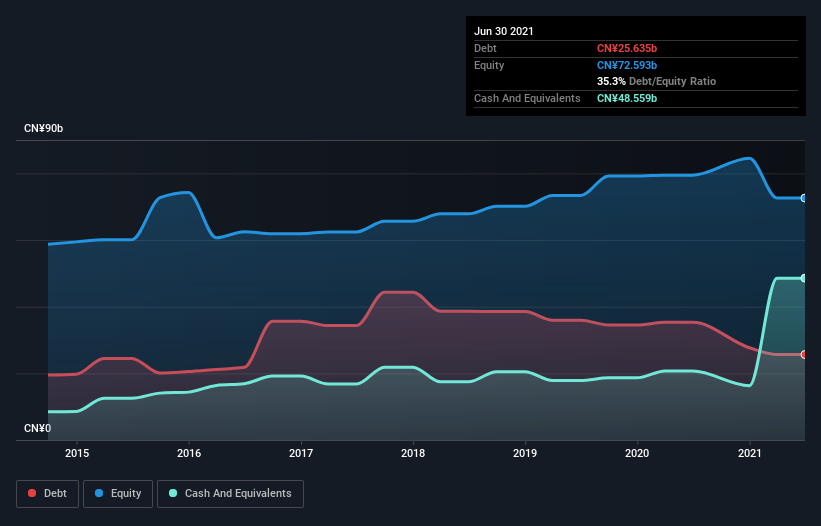- Hong Kong
- /
- Gas Utilities
- /
- SEHK:135
These 4 Measures Indicate That Kunlun Energy (HKG:135) Is Using Debt Reasonably Well

The external fund manager backed by Berkshire Hathaway's Charlie Munger, Li Lu, makes no bones about it when he says 'The biggest investment risk is not the volatility of prices, but whether you will suffer a permanent loss of capital.' So it seems the smart money knows that debt - which is usually involved in bankruptcies - is a very important factor, when you assess how risky a company is. Importantly, Kunlun Energy Company Limited (HKG:135) does carry debt. But the more important question is: how much risk is that debt creating?
When Is Debt Dangerous?
Debt and other liabilities become risky for a business when it cannot easily fulfill those obligations, either with free cash flow or by raising capital at an attractive price. In the worst case scenario, a company can go bankrupt if it cannot pay its creditors. However, a more common (but still painful) scenario is that it has to raise new equity capital at a low price, thus permanently diluting shareholders. By replacing dilution, though, debt can be an extremely good tool for businesses that need capital to invest in growth at high rates of return. When we think about a company's use of debt, we first look at cash and debt together.
Check out our latest analysis for Kunlun Energy
What Is Kunlun Energy's Debt?
The image below, which you can click on for greater detail, shows that Kunlun Energy had debt of CN¥25.6b at the end of June 2021, a reduction from CN¥35.3b over a year. But it also has CN¥48.6b in cash to offset that, meaning it has CN¥22.9b net cash.

A Look At Kunlun Energy's Liabilities
Zooming in on the latest balance sheet data, we can see that Kunlun Energy had liabilities of CN¥50.1b due within 12 months and liabilities of CN¥23.8b due beyond that. Offsetting these obligations, it had cash of CN¥48.6b as well as receivables valued at CN¥4.02b due within 12 months. So it has liabilities totalling CN¥21.3b more than its cash and near-term receivables, combined.
Kunlun Energy has a market capitalization of CN¥61.2b, so it could very likely raise cash to ameliorate its balance sheet, if the need arose. But it's clear that we should definitely closely examine whether it can manage its debt without dilution. While it does have liabilities worth noting, Kunlun Energy also has more cash than debt, so we're pretty confident it can manage its debt safely.
The modesty of its debt load may become crucial for Kunlun Energy if management cannot prevent a repeat of the 33% cut to EBIT over the last year. When a company sees its earnings tank, it can sometimes find its relationships with its lenders turn sour. When analysing debt levels, the balance sheet is the obvious place to start. But ultimately the future profitability of the business will decide if Kunlun Energy can strengthen its balance sheet over time. So if you want to see what the professionals think, you might find this free report on analyst profit forecasts to be interesting.
Finally, while the tax-man may adore accounting profits, lenders only accept cold hard cash. While Kunlun Energy has net cash on its balance sheet, it's still worth taking a look at its ability to convert earnings before interest and tax (EBIT) to free cash flow, to help us understand how quickly it is building (or eroding) that cash balance. During the last three years, Kunlun Energy produced sturdy free cash flow equating to 69% of its EBIT, about what we'd expect. This free cash flow puts the company in a good position to pay down debt, when appropriate.
Summing up
While Kunlun Energy does have more liabilities than liquid assets, it also has net cash of CN¥22.9b. The cherry on top was that in converted 69% of that EBIT to free cash flow, bringing in CN¥9.9b. So we don't have any problem with Kunlun Energy's use of debt. There's no doubt that we learn most about debt from the balance sheet. But ultimately, every company can contain risks that exist outside of the balance sheet. We've identified 3 warning signs with Kunlun Energy (at least 1 which is a bit unpleasant) , and understanding them should be part of your investment process.
If, after all that, you're more interested in a fast growing company with a rock-solid balance sheet, then check out our list of net cash growth stocks without delay.
If you're looking for stocks to buy, use the lowest-cost* platform that is rated #1 Overall by Barron’s, Interactive Brokers. Trade stocks, options, futures, forex, bonds and funds on 135 markets, all from a single integrated account. Promoted
Valuation is complex, but we're here to simplify it.
Discover if Kunlun Energy might be undervalued or overvalued with our detailed analysis, featuring fair value estimates, potential risks, dividends, insider trades, and its financial condition.
Access Free AnalysisThis article by Simply Wall St is general in nature. We provide commentary based on historical data and analyst forecasts only using an unbiased methodology and our articles are not intended to be financial advice. It does not constitute a recommendation to buy or sell any stock, and does not take account of your objectives, or your financial situation. We aim to bring you long-term focused analysis driven by fundamental data. Note that our analysis may not factor in the latest price-sensitive company announcements or qualitative material. Simply Wall St has no position in any stocks mentioned.
*Interactive Brokers Rated Lowest Cost Broker by StockBrokers.com Annual Online Review 2020
Have feedback on this article? Concerned about the content? Get in touch with us directly. Alternatively, email editorial-team (at) simplywallst.com.
About SEHK:135
Kunlun Energy
An investment holding company, engages in the exploration, development, production, and sale of crude oil and natural gas.
Flawless balance sheet, good value and pays a dividend.


